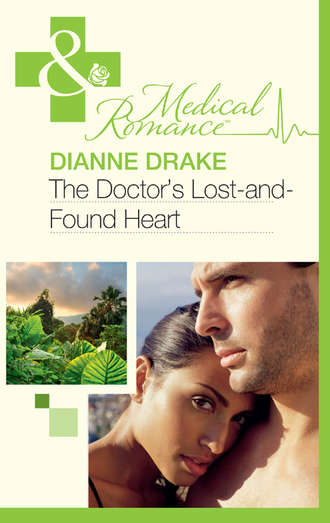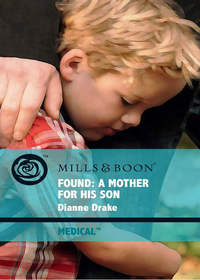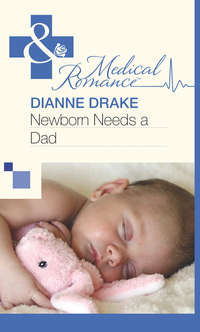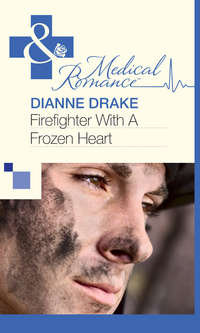
Полная версия
The Doctor's Lost-and-Found Heart
“There’s something wrong with being irresponsible? Lots of people do it every day, and do it well.”
“You sound like you believe irresponsibility could be an admirable goal.”
“Not admirable. But definitely a goal for some people. Me included, if I get my way. And don’t pull out your analyst’s couch and tell me to lie down because there’s nothing there you’d be interested in.”
“Don’t underestimate yourself, Doctor. I think I’d find plenty to interest me if you were stretched out on my couch.”
“Let me guess. You’re psychoanalyzing me, aren’t you? Because my goal is not to have a goal.” It was said with a certain amount of amusement, because the idea of boots off and under her analyst’s couch was suddenly the only thing on his mind. Boots off, belt off, stethoscope off …
“I don’t psychoanalyze. I treat conditions.”
“And I’m a condition to treat.”
“You’re entitled to your opinion,” she countered, her smile never breaking.
“My opinion is I’m the challenge you may want to take on, which is why you’re here. But I’m also the challenge you won’t crack, which is why I came.”
“Faulty logic,” she quipped. “You’re here because you did crack under the challenge. Caved right in when I asked.”
“Or agreed because there was a need for my services, as simple as that.” Caved right in was more like it, but he wasn’t about to give her the advantage of letting her discover she was right about him. Amanda was resourceful. She’d find a way to use that kind of information again. Which, on second thought, might be interesting. Too bad he didn’t even go as far as interesting. “Oh, and in case you’re interested, I’m impressed by your hospital.”
“Changing the subject, Jack?”
He laughed. “You bet I am. It’s safer that way.”
Her smile didn’t waver, but the edges around it softened. “Then the conversation is changed. Wouldn’t want you feeling uncomfortable.”
“Sounds like you’re not really changing the conversation, just twisting it around to suit your purposes. Only my opinion, of course.”
“My only purposes are what concerns the hospital. But Caridad is nice, isn’t it?” she asked, taunting him with her eyes. “I’m proud of what Ben’s done here. Which is why, when I’m running off to Argentina a few times a year, it may seem like a whim to some, but I’m actually here doing something I believe in with all my heart.”
Something about her looked different. He studied her for a second, realized her hair wasn’t twisted into its usual tight, librarianesque knot at the nape of her neck. It was loose, full of curl, wild. And her eyes had … The only way he could describe what he saw was los ojos del fuego. Eyes of fire. She was Amanda Robinson, but a different version from that he knew back in Texas. “So, I’m assuming we’re roommates?” he said, turning around and walking over to join Ezequiel at his bedside.
“Yep, roommates. You over there, me over here, curtain down the middle.” She bumped her bureau drawer shut with her hip, then grabbed a handful of clothes she’d left on the bed, and headed for a nook he figured had to be the bathroom. “You don’t mind sharing, do you?” she called back over her shoulder, as she pushed back the door to the nook and walked into the room behind it. “Because the supply closet in the hospital isn’t taken, if you’d rather have that. But you’d have to sleep sitting up.”
“I’m fine,” he said, kicking off his leather cowboy boots and letting them fly to the floor in the middle of the room.
“Good. Because the supply closet is a tight fit, especially if you’re claustrophobic.”
Except he wasn’t claustrophobic. Right now, though, he was feeling a little gynophobic. Afraid of women. One woman in particular. Amanda Robinson was different, and that bothered him. What bothered him even more was that he was bothered about it in the first place.
In the tiny bathroom, the only place where’d she’d be able to find privacy in their living arrangement, Amanda leaned back against the door and drew in a deep breath to steady her nerves. She was shaking. Actually shaking … hands, knees, a few parts in between. So, what was that about? She knew Jack, had been the one to ask him here. Now, seeing him out of his Texas element … Even her breath was shaking as she shut her eyes and conjured up his image. Usual rough cut even rougher. Hair mussed, that sexy, sexy dark stubble on his face. Even the glisten of sweat on his face made him sexy. Sexy …
No! He couldn’t be sexy. This wasn’t about sexy.
Amanda’s eyes flew open to stop the flow of pure sexual fascination with a man she was trying hard to repudiate as sexy. And failing miserably. Yet what had all that dialogue been about, especially the part where she had been getting him stretched out on her couch? Really? Was that what she’d said to him? Her analyst’s couch, for heaven’s sake!
Another round of shakes hit her because she didn’t know what had come over her, and she didn’t like it the least little bit that, rather than annoying her, his streak of opposition had tweaked something. Woken it up. Lit some kind of a fire.
It was like she was seeing Jack for the first time. Enjoying what she was seeing way more than she should. And now she was getting stressed out about sharing quarters with him, sleeping mere feet away from him. Forming an intimacy by proximity, something that had never bothered her all those years she’d slept in the hospital on call with colleagues and strangers alike. It was a bed, and everybody concerned was too tired to care who was in the bed across from theirs.
Except now she wasn’t tired, and she did care, because … Well, it was the jungle. It was always the jungle, and the jungle always made her feel like someone other than who she was. Why? No clue. But from the moment she arrived here—every single time she arrived here—the old Amanda started giving way to the new one. Sometimes it crept out of her by slow measures, sometimes it leaped, like a hungry panther.
Sure, there had to be a psychology to it, and as a psychologist she should have been able to figure it out. But maybe she liked the way she felt when she unpinned her hair and took off her pearls, which was why she avoided that little analysis. It just plain felt good to be Argentina Amanda.
So here she was, throwing off those figurative pearls by changing into something more comfortable than linen slacks and fitted blouse, anxious to get on with the panther inside her. Yet when she opened the door, she couldn’t take that leap. That was the other Amanda fighting to take her back. The one who took control so completely now all she could do was stand in the doorway and stare at Jack, who’d apparently shooed Ezequiel away then stretched out flat on his bed. Either asleep already, or trying to bring on a self-induced trance.
She took a deep breath to calm herself, and to help her hang on to the last few shreds of that other Amanda … shreds she was a little afraid to let go of. “Look, Ben’s in clinic for another hour, and I’m on my way to the kitchen to see what I can find to eat. Care to come with me?”
“Thanks … not hungry,” Jack said.
“Thirsty? There’s always a pitcher of fresh lemonade.”
“Not thirsty.”
This was the way it was going to be? “Are you always so non-responsive?” she asked.
“Pretty much.”
“Why?”
“Why not?”
“Because you’re a doctor, and doctors are supposed to be responsive.” He rose up, arched the sexiest eyebrows she’d ever seen in her life, and simply stared so hard at her she began to feel self-conscious. “What?” she finally asked.
He didn’t answer, though. Instead, he lay back down and shut his eyes. Then finally said, “You’re being responsive enough for the both of us. No need for me to join in and interrupt what you’re doing so well.”
Now he was playing with her. Look out, Jack Kenner. Because as sexy as he was to look at, he was just that challenging to be around, and she did love a good challenge. A thought that added just a bit more jungle wind to Amanda’s sails as she tossed the clothes she’d been wearing down on her bed, then headed to the door of the hut. “Well, here’s one more responsive moment from me, Jack. Those boots … keep them under your bed. Not in the middle of the floor. In fact, keep everything about you on your side. I don’t like messiness.”
“And I don’t like fussy roommates. Which makes this a stand-off, doesn’t it?”
“Not really,” she said, smiling as she spun around and marched straight back to the middle of the room, where she bent down, picked up those boots then strode straight to the window, opened it and hurled them outside. “Not when there’s a simple solution.”
Jack’s only response was to rise up again, give her a good, hard stare, toe to head, then back down again. A stare so hard she could feel it graze her curves. Suddenly she was feeling self-conscious that her white shorts might be a little too short, or her white vest top a little too tight. Too much leg, too much chest.
“Okay, then,” she finally said when Jack said nothing. “If you change your mind about that lemonade …”
By the time she was finally pouring that lemonade, she was back on course. Not as much as she wanted to be, though. Because that little episode in the guest hut, that up-and-down emotional swing—attracted, frustrated, attracted, frustrated—definitely wasn’t her. These clothes weren’t her. Nothing here was her. Not really. Yet it all felt so right. All except Jack, and she had no idea how what was going on inside her raised so many quivers, hackles, goose bumps and objections all at the same time.
The thing was, she knew she should avoid Jack. Maybe even wanted to. But could she? Truly, honestly, could she? And if she could, would she?
CHAPTER TWO
“I KNOW you’re familiar with the basic concept, but let me give you a little background on hospital-acquired infections,” Jack said, settling into a wooden chair across the table from Amanda, trying hard to regard her professionally. Not easy considering the way she looked.
“Believe me, I’ve been reading. And I think my brother has probably spent some time on his hands and knees trying to sanitize the ward. The thought of being sick because of something we’re doing … ” She shook her head. “We’ve got to stop it, Jack. Whatever it takes, we’ve got to stop it.”
“Might not be what you’re doing so much as what’s being done to you,” Jack said. “Everybody blames themselves, especially in smaller, more contained hospitals like Caridad, but these bugs, as I’ll call them for lack of a better definition, aren’t predictable, and just when you think you’re on to something … ” He shrugged. “Everything changes. Like life, in a lot of ways.”
He studied Amanda for a moment, saw absolutely no resemblance to Ben whatsoever. While Ben was fair, she was so … His guess would have been Argentinian, actually. Possibly from the Pampas region, Mapuche descent, which she wasn’t, of course. But maybe that was just what he wanted to see in her because her eyes were the same color as Rosa’s, and her skin the same tone. Odd, how coming back after all this time affected him, seeing Rosa everywhere he looked.
“Anyway,” he continued, shaking himself back into the moment, “internationally, the incidence of a hospital-acquired infection makes up nearly nine percent of all hospitalizations, with pediatrics being even higher than that. Unfortunately, in Latin and South America, more of these infections turn into critical situations than in most other areas in the world. And we’re talking things like methicillin-resistant Staphylococcus aureus, an Enterobacter species resistant to ceftriaxone, and even Pseudomonas aeruginosa resistant to fluoroquinolones. To name a few.”
Amanda pushed a can of soda in Jack’s direction, and leaned back in her chair. “So what do we do about Caridad to keep this thing from spreading? It won’t take much to shut our doors, and the area can’t afford to have us shut down for even a little while because the next nearest medical service is about half a day away.” She paused, took a drink of her own soda, then set the can down on the table. “This is killing my brother. He blames himself.”
“But it’s not his fault.”
“Logically, he knows that. He feels responsible, though. That’s the way he is, taking on everybody’s problems. I mean, the first time I ever met him, there he was all stalwart in his new brother duties, showing me around the house, the yard, the neighborhood. You’d have thought he was going to be my adoptive father and not my brother. Yet he has that sense of purpose ….”
She was adopted? So, maybe he was right. “It’s human nature to feel responsible when we’re sidelined the way Ben is right now. He sees his world falling apart and there’s not a damned thing he can do about it. But he’s lucky to have a sister who cares.”
“You have Cade.”
“Cade and I are only now becoming acquainted. I think that kind of relationship is a long way off for us.”
“I hope it happens, because you’re right. I’m lucky. Ben and I are as opposite as two people could be in most regards, which is pretty obvious, but we formed a tight bond almost instantly.” She laughed. “After he quit trying to find ways to get rid of me. He sold me a couple times, traded me, and then there was the time he simply took me down the street to the neighbor’s house and told me to wait on the doorstep until they came home, then tell them it was their turn to be my parents.”
“Did you?”
She nodded, and her eyes softened. “And Ben got in so much trouble. But he felt threatened, having this new sister just drop in from nowhere. Maybe if my parents had adopted me when I was a baby … ” Pausing, the slight smile of reminiscence dropped from her face. “Jack, you’re pretty straightforward. I don’t think you’d soft-pedal something to spare someone’s feelings.”
“That’s a pretty low opinion of me.”
“But I heard you at the hospital back in Texas, the way you talked to people, your interactions.”
“I’ve been accused of being blunt.”
“Then be blunt with me. Tell me what you see when you look at me. You’ve traveled extensively, lived in so many places around the world—South America, Africa, the Mediterranean regions. More than anybody I’ve ever known. So, when you look at me, do you see anything you recognize? A nationality? The hint of something you’ve seen before somewhere? Because of your background, I’ve wanted to ask you almost from the first time we met. But how do you simply blurt out something like that? And I’ll admit I’m a little afraid to know.”
“It wasn’t in your adoption records?”
She shook her head. “There weren’t any adoption papers, no records. Nothing.”
Jack swallowed hard. But didn’t answer.
“I’ve tried to find out. But the best I’ve come up with is that the adoption agency told my parents they believe I’m from some sort of Mediterranean background. Except …”
“Except you don’t believe that.”
“Except when I look in the mirror and want to believe that I am, the image looking back at me doesn’t have a clue. But you do, don’t you? You’re trained to observe, and you don’t miss things. That’s what makes you the best in the world at what you do.”
“Hospital infections and what you’re asking me to do are two entirely separate things, Amanda,” he said, not sure what to do with this. “What I do with a hospital infection is make a logical guess based on what I see, then do the tests to prove I’m either right or wrong.”
“How often are you wrong?”
He shook his head. “Never,” he said, clenching his jaw so hard the ache was starting to set in.
“Then make a logical guess based on what you see.”
“Why me?”
She smiled. “Remember the first time we met? You asked for a list of my credentials, even though I’d already worked with your nephew for several months, and his parents were pleased with his progress. But there you were all big and blustery and none too friendly, making your demands. Then what I found out later … You actually called and checked me out. Asked every last reference on my list about me. Which was fine. I wish more people would do that when it comes to hiring the people who take care of their children. And while that really wasn’t your responsibility since you’re Michael’s uncle, not his father, I liked that you were so forthright. Pegged you for a man who would always be honest, maybe sometimes brutally so. And you have your suspicions about my heritage, don’t you?”
“I’m not even sure why you’d come to that conclusion.”
“Because of the way you look at me. Sometimes you stare, and it’s so … penetrating.”
“The way a guy stares at a gorgeous woman, you mean?”
She shook her head. “That’s not it. Oh, I’ve seen that look, more here than back in Texas. But that’s not what I’m talking about. You give it away in your eyes, Jack. Not for long, but there’s this flash … I saw it when I asked you. Saw it before that, actually.”
She was probably right. What had caught him off guard, and what he’d tried to cloak, was that he saw Rosa in Amanda. Same eyes, same beautiful wild hair, same delicate bone structure. It was a look he wouldn’t confuse with any other look in the world because the person he’d loved most had had that look. He’d come unglued, tried not looking, but sometimes couldn’t stop himself. He was like a moth attracted to the flame. So if Amanda had caught that flash in his eyes, she’d caught it correctly. “Maybe this is something you should discuss with your family.”
“I have. Too many times. Which is why I’m talking to you now. Why I’m asking you. Please, be honest with me, Jack. Respect me enough to do this one thing. When you look at me, who are you seeing?”
“A beautiful Mapuche woman.” They were words he shouldn’t have said, but words he felt bound to say because anything else bought into the lies that had cost Rosa her life. And for Rosa, he had no choice but to be honest.
“Mapuche?”
Nodding, he said, “Someone I loved once, a long time ago, was Mapuche. They’re an indigenous people from the Pampas. I lived with them for a couple of years, working as a doctor in some of the villages.”
“And you recognized that in me?”
“I did.”
“Then thank you for your honesty.”
“Amanda, I …”
She shook her head. “Just leave it where it is, Jack. I asked, you answered. It’s what I wanted.” More than that, it’s what she needed, and she was numb with it, didn’t know what to think, what to do. But Jack had given her something no one else ever had and for that she was grateful. “I think I always knew,” she whispered.
“Knew what?” he asked gently.
“That what my parents told me was … off, somehow. Doesn’t matter, though, does it?”
“Who we are always matters, Amanda.”
“Or who we aren’t? Anyway, I have a very important date in a few minutes, so back to the problem at Caridad. What’s your plan?” She needed time to think about this, to readjust. To let the emotion catch up. But not here, not now. “And tell me what we can do to assist you.”
“Are you sure? Because—”
She cut him off by nodding her head. “I’m sure.” Not said convincingly enough, but Jack understood. The tone of his voice, the sense of concern emanating from him—yes, he understood.
“Fine.” He paused, nodded. “But anytime you want to talk …”
“The hospital, Jack. Please, make this about the hospital now.” No matter how distanced she was feeling from everything she knew.
“Well, then, no more cleaning, to start with. I need to find the source of contamination before I do anything else, then culture it to see what grows. Which means I’ll look in all the usual places and get creative after that because in my experience the usual places don’t really yield what I want.”
“It’s an odd specialty.”
“But, as they say, someone has to do it.”
“Why?”
“Public health was always what I wanted to do. You know, take care of the people no one else wanted to take care of.”
“Because of Robbie?” she asked. Jack’s brother Cade had told her once about Robbie, about how his parents hadn’t wanted to raise a child with severe autism.
“You know about my brother?”
She nodded. “The child nobody wanted.”
“After he died, I wanted to find a way to take care of people who were overlooked the way he was. He died because no one noticed him.”
“He ran off, didn’t he?”
Jack nodded. “No one saw that he had been missing for a while and he wasn’t found until it was too late. When I became a doctor I wanted to make a difference for people who, like Robbie, weren’t noticed until it was too late, which was why I chose public health. What I do now grew out of that as conditions in some of the places I chose to work in weren’t good. So, you’d cure the patient and find the source of the illness in so many cases—fleas, ticks, four-legged critters, bacteria.”
“But you quit or, at least, you’ve stepped away for a while, haven’t you? That’s what Cade told me. He said it’s why you were hanging around Big Badger, why you were thinking about working with them at the hospital they were starting.”
“You’re right. I’ve stepped away. Not sure if I’ll go back and work at the hospital, or not. Haven’t decided … personal reasons. It’s complicated.”
Personal reasons he wouldn’t divulge. She could see it in his eyes, like she could see the well-practiced resistance there, as well. Jack had given her what she’d wanted and now it was her turn to do the same. She’d broached a subject he didn’t want to talk about, so she wouldn’t pry. As a psychologist, it was her second nature to ask, especially when she saw so much distress. But for Jack she would go against that nature. It was the least she could do.
“Okay, well … You have free rein here, Jack. Whatever you need to do is fine, and if I can help you, let me know. We do have some funds … ” She stood, then spun around to the beat-up old refrigerator behind her, opened it and grabbed a pitcher of juice—apple-pear mix from Patagonia. “But not a lot. So whatever you can do to be conservative would be appreciated. And right now I’m going to go have juice in the garden with Maritza Costa. Ventricular septal defect. Congenital.” Meaning, a small hole in her heart. “She’s feeling better today, and I think a nice walk in the fresh air will do her good.”
“You’re treating her how?”
At the mention of a child with a heart condition Jack’s face turned to stone. Amanda saw it, saw the visible change come over him. Such a drastic turnabout, it made her curious. One curiosity among many, she was only beginning to discover. “With medicine only, for the time being,” she explained. “And observing her. She got sick, probably a cold, and it lingered, so her parents brought her in and that’s when Ben made the discovery. She’s been a normal, healthy little girl, without any cardiac problems. So we’re being cautiously optimistic we can keep her regulated with the most conservative treatments, because we can’t convince her parents to let us send her to another facility for more sophisticated testing, maybe even surgery.”
“What about a cardiac cath? They use them more and more these days to close small holes, and it’s a safe procedure. Proving itself worthy of the task.”
“Maybe it is,” she continued, “if we had the means to perform a cardiac catheterization, which we don’t. That equipment’s on the list of things we hope to be purchasing in the next year or so.”
“So in the meantime …”
“We keep a close eye on her and try to keep her as healthy as we can.”
“Or go argue some sense into her parents.”
“Believe me, Ben would have done that months ago if he’d thought it would work. But we have to maintain the balance here, because the people … While they want the medical help, they’re always a little suspicious of outsiders.”
“A little?” he snapped. “They’d let that child die because they’re a little suspicious?”
“She’s not critical, Jack. And we’re doing the best we can.”
“But what happens when your best isn’t good enough anymore?”










